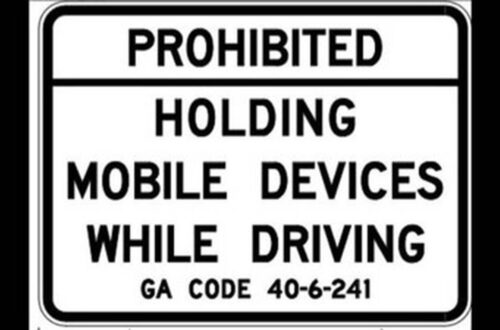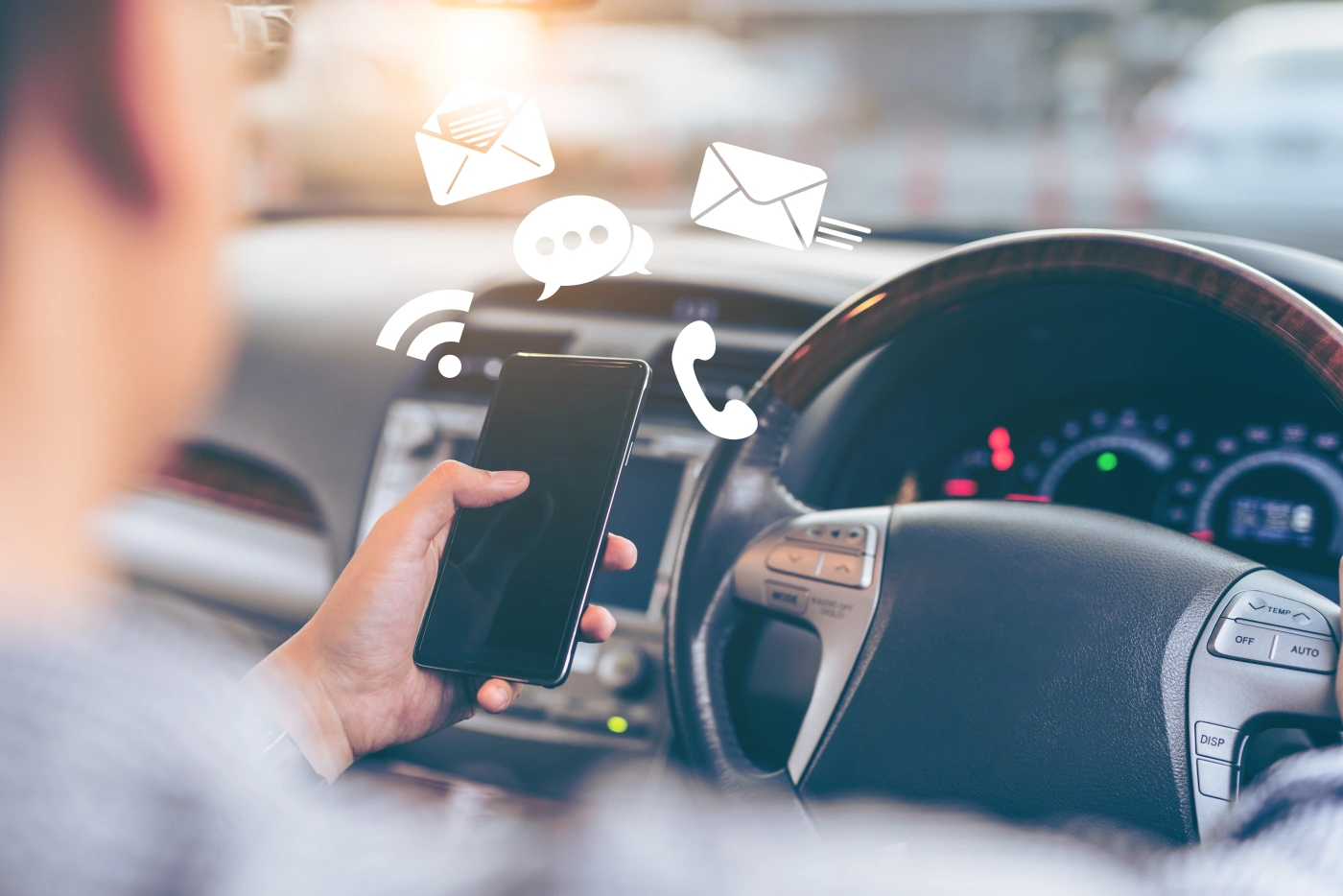To avoid the tragic consequences of texting while driving, you must realize that it's like driving blindfolded for 4.6 seconds, covering a football field's length at 55 mph. This dangerous habit greatly raises the chances of severe accidents that threaten all road users. Your delayed responses, impaired decision-making, and inhibited motor skills heighten the risk. Remember, understanding these risks is vital for your safety on the road.
Understanding the Risks
To comprehend the dangers of texting while driving, consider the alarming statistics on accidents caused by this risky behavior. Each day, approximately 9 people lose their lives and over 1,000 are injured due to distracted driving incidents, with texting being a major contributor. When you take your eyes off the road to read or send a text message, you are basically driving blindfolded for an average of 4.6 seconds. In that short span, your vehicle traveling at 55 mph covers a distance equivalent to a football field. This reckless act greatly increases the likelihood of a devastating collision.
Not only does texting while driving jeopardize your safety, but it also endangers the lives of others on the road. Your split-second decision to check a notification or reply to a message can have lasting consequences for you, your passengers, pedestrians, and other motorists. Remember, no text is worth putting yourself and others at risk. Stay focused on the road and prioritize safety over the urge to text.
Legal Consequences and Penalties
Failing to adhere to laws prohibiting texting while driving can result in severe legal consequences and penalties. In many states, texting while driving is considered a primary offense, meaning law enforcement can pull you over solely for texting behind the wheel. The penalties for this offense often include hefty fines, points on your driving record, and even the possibility of license suspension.
Moreover, if texting while driving leads to an accident causing injury or death, the legal ramifications can be even more severe. You could face criminal charges such as vehicular manslaughter or reckless driving, which may result in significant fines, imprisonment, and a permanent criminal record. These consequences not only impact you legally but also have long-lasting effects on your personal and professional life.
To avoid these dire outcomes, it is important to prioritize safety on the road and refrain from texting while driving. Remember, a simple text is never worth risking your life or the lives of others.
Impact on Reaction Time
When you text while driving, your reaction time is greatly impacted, putting yourself and others at risk on the road. Texting diverts your attention away from the task of driving, affecting how quickly you can respond to unexpected situations. Here are five ways texting while driving can impact your reaction time:
- Delayed Responses: Texting requires visual, cognitive, and manual attention, causing delays in reacting to road hazards.
- Increased Stopping Distance: Being distracted by texting can prolong the time it takes for you to apply the brakes in an emergency.
- Slower Recognition of Danger: Focusing on your phone screen can make you slower to recognize potential dangers ahead.
- Difficulty in Making Quick Decisions: Texting diverts your mental resources, making it harder to make split-second decisions while driving.
- Inhibited Motor Skills: Typing out messages while driving can impair your ability to steer the vehicle or use other controls promptly.
These factors combined underscore the critical need to avoid texting while driving to safeguard your safety and the safety of those around you.
Distractions and Cognitive Load
Distractions and cognitive load impact your ability to focus on the road while texting, increasing the risks of accidents and harm to yourself and others. When you engage in texting while driving, your cognitive load is divided between the task of composing or reading messages and the essential task of driving safely. This division of attention can lead to decreased awareness of your surroundings, delayed reaction times, and impaired decision-making abilities.
Moreover, distractions such as incoming notifications, phone calls, or conversations further add to the cognitive load, making it even more challenging to concentrate on driving. Your brain struggles to switch rapidly between texting and driving, affecting your capacity to process information effectively and respond to potential hazards on the road promptly.
As a result, the combination of distractions and increased cognitive load significantly hinders your ability to react swiftly to unexpected situations while driving. To prevent accidents and safeguard yourself and others on the road, it is crucial to minimize distractions, focus solely on driving, and avoid texting altogether while behind the wheel.
Technology Solutions and Apps
Utilizing innovative technology solutions and apps can assist in reducing distractions while driving and enhancing overall road safety. By incorporating these tools into your driving routine, you can actively work towards minimizing the risks associated with distracted driving. Here are five impactful ways technology can help you stay focused on the road:
- Voice-activated assistants: Use voice commands to send messages, make calls, or change music without taking your hands off the wheel.
- Bluetooth connectivity: Connect your phone to your car's audio system to answer calls hands-free and listen to messages without looking at your device.
- Do Not Disturb while driving feature: Activate this setting on your phone to silence notifications and calls while you're on the road.
- Navigation apps with voice guidance: Follow directions audibly instead of looking at the screen for guidance.
- Driver fatigue monitoring systems: Some apps can detect signs of drowsiness and alert you to take a break, ensuring you stay alert while driving.
Advocacy and Awareness Campaigns
To raise awareness and promote safe driving habits, advocating for stricter laws and launching educational campaigns is essential. Advocacy groups play a vital role in pushing for legislation that deters distracted driving. They lobby lawmakers, organize events, and work to keep this issue in the public eye. These campaigns aim to educate drivers about the dangers of texting while driving and encourage them to prioritize safety on the road.
Awareness campaigns utilize various mediums to reach a wide audience. Social media, billboards, commercials, and community events are just a few examples of platforms used to spread the message. By highlighting real-life stories, statistics, and consequences of texting while driving, these campaigns aim to create a sense of urgency and responsibility among drivers.
Engaging with these advocacy and awareness campaigns can help you understand the impact of distracted driving and empower you to make safer choices behind the wheel. Stay informed, support initiatives that promote safe driving practices, and encourage others to do the same. Together, we can work towards reducing accidents and saving lives on the road.
Personal Commitment to Safe Driving
When it comes to safe driving practices, your personal commitment plays a crucial role in guaranteeing road safety for yourself and others. Making a conscious decision to prioritize safety not only protects you but also contributes to creating a safer environment for everyone on the road. Here are five key ways you can personally commit to safe driving:
- Avoid Distractions: Keep your focus on the road at all times by sidestepping distractions like texting, eating, or adjusting the radio while driving.
- Follow Speed Limits: Adhere to posted speed limits to maintain control of your vehicle and react promptly to any unexpected situations.
- Wear Seat Belts: Always wear your seat belt and ensure that all passengers do the same to minimize the risk of injuries in the event of a collision.
- Never Drive Under the Influence: Never drive under the influence of alcohol, drugs, or any substance that impairs your ability to drive safely.
- Practice Patience: Stay calm and patient behind the wheel, respecting other drivers and avoiding aggressive behaviors that can lead to accidents.
Frequently Asked Questions
Can Texting While Driving Lead to Long-Term Cognitive Impairment?
Prioritizing safety and avoiding distractions on the road can indeed lead to long-term cognitive impairment. Make sure to stay focused on driving to protect yourself and others from potential harm.
How Do Distractions From Passengers in the Car Compare to Distractions From Texting While Driving?
When driving, distractions from passengers can still divert your focus, but texting poses a greater risk due to the visual, manual, and cognitive attention it demands. It's important to prioritize safety and minimize all distractions while on the road.
Are There Any Studies That Show a Correlation Between Texting While Driving and Increased Likelihood of Being Involved in a Car Accident?
Studies have consistently shown a strong correlation between texting while driving and an increased likelihood of being involved in a car accident. It's essential to prioritize safety and avoid distractions to prevent dangerous situations.
What Are Some Strategies for Resisting the Urge to Check or Respond to Text Messages While Driving?
When driving, focus on the road ahead. Set your phone to silent or out of reach. Use apps that block texts while driving. Remember, your safety is top priority. Stay vigilant and avoid distractions for a safe journey.
Are There Any Specific Demographics That Are More at Risk for Texting While Driving, and if So, Why?
You might wonder about demographics at higher risk for texting while driving. Young drivers often face this danger due to distractions. Understanding these risks can help in creating targeted educational campaigns and interventions.
Conclusion
To avoid tragic consequences of texting while driving, remember the risks involved, the legal penalties you could face, and the impact on your reaction time. Be aware of the distractions and cognitive load it creates, and consider using technology solutions or apps to help you stay focused on the road. Support advocacy and awareness campaigns, and make a personal commitment to safe driving habits to protect yourself and others on the road. Stay safe and keep your focus on driving.



